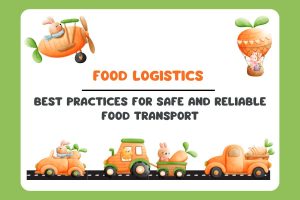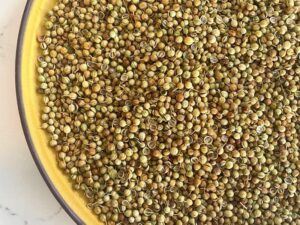Healthy Eating Habits: How to Make Sustainable Food Choices

Eating healthy food not only benefits your body but also the environment. It is crucial to make sustainable food choices that can improve your health and reduce the impact on the planet. Sustainable food choices refer to food that is produced, processed, and consumed in a way that doesn’t harm the environment, the society, or the economy.
In this blog, we will discuss how to make sustainable food choices and develop healthy eating habits.
Buy local produce
One of the easiest ways to make sustainable food choices is to buy locally grown produce. When you buy local produce, you support local farmers, and it reduces the carbon footprint of transportation.
Locally grown produce is fresher, and it tastes better as it is picked when it is ripe.
Choose organic produce
Organic produce is grown without the use of synthetic pesticides, fertilizers, and other harmful chemicals. Organic farming methods use sustainable practices such as crop rotation, composting, and natural pest control.
By choosing organic produce, you not only reduce your exposure to harmful chemicals, but you also support sustainable farming practices.
Eat a plant-based diet
A plant-based diet is not only healthy for your body, but it is also good for the environment. The raising of animals for food is a notable cause of emissions of greenhouse gases, contamination of water resources, and clearance of forests.
By reducing your intake of meat and dairy products, you can reduce your carbon footprint and help mitigate climate change. Plant-based foods are also rich in nutrients and fiber, which can improve your overall health.
Avoid processed foods
Processed foods commonly contain excessive amounts of harmful fats, salt, and sugar. They also require a lot of energy and resources to produce and package.
By avoiding processed foods, you can reduce your carbon footprint and improve your health. Choose whole, unprocessed foods such as fruits, vegetables, whole grains, and nuts.
Reduce food waste
Food waste is a notable cause of greenhouse gas emissions. The decomposition of food waste in landfills results in the release of methane, a highly potent greenhouse gas.
To diminish food waste, one can plan their meals, purchase only necessary items, and store food appropriately. Use leftovers to make new meals or donate to food banks.
Choose sustainable seafood
Overfishing and unsustainable fishing practices have depleted many fish populations. When you choose sustainable seafood, you support fisheries that use responsible fishing practices and protect marine habitats.
Look for seafood and try best seafood recipes that is certified by organizations such as the Marine Stewardship Council or the Aquaculture Stewardship Council.
Drink tap water
The production and transportation of bottled water demand significant amounts of energy and resources. It also generates a significant amount of plastic waste that ends up in landfills or the ocean. Drinking tap water is not only better for the environment, but it is also cheaper and often safer than bottled water. If you are concerned about the taste or quality of your tap water, use a filter.
Recommended Reading:
- Everything You Need to Know About Textile Recycling
- Could A Vegan Diet Help Prevent Cancer?
- Successful Tips for Losing Weight by Following Ketogenic Diet
- Which Products Should be Included in a Vegetarian Diet?
- Ketogenic Diet Foods
Shop with reusable bags and containers
Plastic bags and containers are a significant source of pollution. By shopping with reusable bags and containers, you reduce your consumption of single-use plastics. Bring your reusable bags and containers when you go grocery shopping or to the farmers’ market.
In conclusion, making sustainable food choices is not only good for the environment, but it is also beneficial for your health.
By choosing locally grown produce, organic foods, a plant-based diet, avoiding processed foods, reducing food waste, choosing sustainable seafood, drinking tap water, and shopping with reusable bags and containers, you can develop healthy eating habits and reduce your carbon footprint. Start small, and make one sustainable food choice at a time. By making environmentally friendly choices, you can promote both personal health and the health of the planet.






